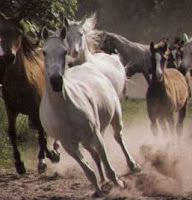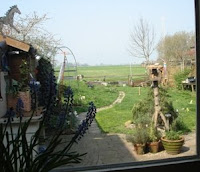Unfortunately all the antispam protection I’ve got rigged up on my computer leaves me with meagre pickings in Outlook, so before getting down to work in earnest (he doesn’t mind, really) off I whizzed to my webmail accounts. Gmail and Yahoo, as you know, intercept the outrageous in a timely fashion and dump it in their junk bins. Luckily for spamaholics, they leave this true blue stuff hanging round for weeks or don’t ever bother deleting it so that when I’m in the mood for some idle spamusement, like on my return from holiday, I can indulge myself and wallow in spamlets from here to spamernity.
To get your salt-encrusted brain back into shape after lolling about on the beach for too long, I can warmly recommend a good game of “spamogram”. It’s a little something I invented that combines the wild abandon of spam with the formal constraint of the lipogram (no, dummy, that’s not the same as sending a kiss by telegram)(and if you remember what a telegram is, you’re as old as I am) (no, older). Instead of omitting one letter, such as the vowel ‘E’ in a lipogram, my game finds its rigour in omitting everything bar one phrase of the spam message. String those abandoned phrases together in constrained sentences and hey presto, you’ve created an original spamogram, or as I like to call my results, spam jam! Here’s a couple of typical spamples:
Henrietta Hamper
Spam jam I
She arrived dressed in civilian attire. She wanted to know. My God, Genevieve. Did you fly in from 1958? Since my hysterectomy was delayed, I have grown to appreciate that death is natural and there is nothing wrong, but it is always different when it hits. Unstable organs happen in other disorders but the exact sequence of what’s happening here. Upon examination, a familiar aroma of baby powder was detected. Now I see it is obvious. They even took my Paxil. Those who jump off a bridge in Paris are in Seine.
Amazing, Margaret
Spam jam II
The march towards professionalism began with does the name Pavlov ring a bell? This is an especially urgent call at a time when many suspect we’re in the midst of a real estate bubble. So far, the season of the tight end stud has been large. But remember, no one ever won by standing still. You gotta move. As the year turns, add light and colour to your life. It’s the best. Here is a pick you can't afford to miss. Get in on this one before it explodes.
It’s not a joke
Forgive me for lolling in your face, but spam jam is guaranteed to get me giggling, much like those “poorly drawn cartoons inspired by actual spam subject lines” always break me out in hysterical ha-ha-ha’s. But I’m funny like that and then again, I suppose spam jam could be an acquired taste, much like Hormel’s classic SPAM®. (“Taste where it all started. The original flavor from 1937 that turned the world on its tongue.”)
Let me leave you now with those chaps from Monty Python whose sketch, history relates, is the origin of the modern usage of spam. But don’t blame these full Monties for starting the spamming lark. The real culprit, responsible for Opening Pandora’s In-box in 1978 is Gary Thuerk, a marketing manager at Digital Equipment Corp. An ad man, what else? Enjoy, and see you next week!



















